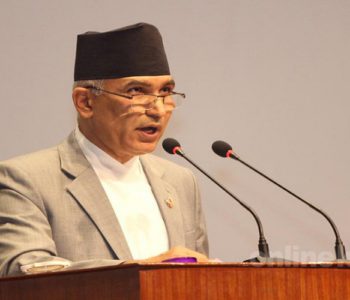Discriminatory regulations push Ncell toward collapse: A blow to Nepal’s investment climate
Ncell’s Sinking Fortunes: How Government Inaction is Killing Nepal’s Telecom Giant
KATHMANDU: In a concerning turn of events for Nepal’s business and telecommunication sector, Ncell, the country’s largest mobile service provider, is on the brink of collapse. The primary culprit behind this impending disaster is not just market competition but rather the government’s apparent reluctance to renew Ncell’s license.
The lack of government support and the imposition of discriminatory policies are clear indications that the authorities are actively working to bring down Ncell in favor of other vested interests. If the current situation persists, Nepal’s foreign direct investment (FDI) inflow will remain nothing but a dream, and the country may find itself isolated from the global business community.
Government’s Reluctance and Discriminatory Policies
The Nepal Telecommunications Authority (NTA) recently issued a letter to Ncell on August 22, urging the company to renew its license by paying the full renewal fee along with penalties. Previously, the government had provided an installment facility to pay the renewal fee, but in this case, Ncell’s request for similar treatment has been dismissed. The government’s reluctance to assist in renewing the company’s license appears to be a calculated move to shut down Ncell and open the door for another company that serves specific vested interests.
The Telecommunications Act of Nepal allows the government to issue necessary directives to the NTA to diversify, expand, and regulate telecommunications services. This provision enables the Cabinet to instruct the NTA to provide installment facilities to companies facing financial difficulties. However, in Ncell’s case, the NTA and the government have seemingly ignored this provision, forcing Ncell into a precarious position.
The NTA’s letter, citing sub-rule 2 of Rule 12 of the Telecommunications Rules, 2054 BS, states that Ncell must pay the renewal fee and an additional charge. Ncell had requested an installment facility for the remaining amount after paying Rs 4 billion of the Rs 20 billion renewal fee by May 27, 2024, three months before the license expiry. Despite this reasonable request, the government and NTA have refused to provide any leniency, further complicating the issue.
Unfair Treatment for Ncell
The treatment of Ncell stands in stark contrast to how the government has handled Nepal Telecom, the state-owned telecom operator. The government accepted the renewal fee of Rs 20 billion from Nepal Telecom without interest or penalties five years after the deadline. Ncell, on the other hand, has been denied a similar opportunity, with its proposal to pay Rs 4 billion annually in installments repeatedly ignored. This clear case of discrimination has raised concerns about the fairness and transparency of Nepal’s regulatory environment.
The government and the NTA have compounded the situation by complicating the renewal process with unnecessary bureaucratic hurdles. The government’s recent probe committee report on Ncell’s share transactions has further muddied the waters. The decision by the Cabinet to suspend share transactions before the license renewal has added to the confusion, making it seem like the government is deliberately trying to sabotage Ncell’s operations.

Legal and Regulatory Challenges
The legal framework governing telecommunications in Nepal is outdated and riddled with contradictions, which has only exacerbated the challenges faced by Ncell. The Telecommunications Act states that if a telecommunications service provider has more than 50 percent foreign investment, the land, buildings, equipment, and structures of the service provider will be under government ownership after the 25-year license period. However, if the foreign investment is less than 50 percent, the property does not come under government ownership. This provision is inherently flawed, as it penalizes foreign investors and discourages further investment in the sector.
The government’s decision to suspend share transactions before the license renewal, despite the Telecommunications Service Provider Property Management Rules, 2079 BS, has created further legal complications.
As per Rule 6 of the Rules, the assets that will be under government ownership after the expiration of the license period cannot be mortgaged, sold, or transferred without the NTA’s approval three years before the license expiry. However, the existing law does not prohibit such actions before that date, making the government’s decision a blatant violation of property rights.
Section 27 of the Telecommunications Act also provides provisions for the sale or transfer of a license, allowing the licensee to sell or transfer their license. However, the government’s contradictory actions have made it nearly impossible for Ncell to exercise its legal rights, further undermining investor confidence in Nepal’s regulatory environment.
Impact on Nepal’s FDI and Economy
The discriminatory policies and bureaucratic hurdles faced by Ncell are not just a threat to the company but also to Nepal’s broader economy and its ability to attract foreign direct investment (FDI). Since its establishment, Ncell has made a significant contribution to Nepal’s economy, paying over Rs 3.2 trillion in taxes and non-taxes to the government as of the fiscal year 2023-24. The company alone paid over Rs 20 billion in various taxes and fees to the government in the fiscal year 2023-24.
Ncell has also played a crucial role in providing direct and indirect employment to around 25,000 people. Additionally, the company has contributed over Rs 2 billion to social development under its corporate social responsibility (CSR) initiatives, including education, environment, and health. The potential collapse of Ncell due to government negligence and discriminatory policies would have a devastating impact on these areas, further exacerbating Nepal’s economic challenges.
Telecommunication Sector in Decline
The challenges faced by Ncell are indicative of a broader decline in Nepal’s telecommunications sector. Both Ncell and Nepal Telecom have been bleeding revenue for years, impacted by the rise of Over-the-Top (OTT) services, a decline in international long-distance (ILD) revenues, and the limited contribution of data services despite increased demand.
Customer demand for data continues to accelerate, yet data pricing has dropped due to competition, with no provisions or restrictions from the government to review service charges in line with investment and inflation.
The revenue of Nepal’s telecommunications sector has declined by 25 percent over the past five years. In contrast, neighboring countries like Bangladesh and Sri Lanka have seen substantial growth of 40 percent. Nepal’s per customer per month data intake is just 4.5 GB, while in India, it is 20 GB. Digital literacy in Nepal remains low, and there are restrictions on the operation of Digital Value-Added Services (DVAS), further stifling growth in the sector.
The lack of a level playing field in the telecommunications sector is another major issue. The government favors state-owned operators like Nepal Telecom, while private sector companies like Ncell are treated with suspicion and often accused of cheating consumers. This mindset has further eroded investor confidence, making it difficult for the private sector to compete and thrive in the market.
A Shrinking Market
The decline in revenue and profitability has led to a shrinking telecommunications market in Nepal. The telecom industry, which used to account for 5 percent of Nepal’s GDP, now contributes just 2 percent. The market size has shrunk from NPR 100 billion to below NPR 75 billion, reflecting the overall decline in the sector.
With shrinking revenue and profitability, the mobile industry in Nepal now invests 2 to 3 times its profitability just to maintain the network. The deployment of future technologies like 5G will require around NPR 60 billion, which is 12 times higher than the current profit levels. This investment will be challenging to secure given the current financial results and the government’s lack of support for the industry.
Government Targets and Unattainable Goals
The government’s target to export IT services worth NPR 3 trillion in the next 10 years and produce 1.5 million IT workers is ambitious, but it is unattainable without the support and growth of the major ecosystem player in the Information and Communication Technology (ICT) sector—the telecommunications industry. The current policies and regulatory environment are not conducive to achieving these goals, as they have stifled the growth of the sector and discouraged further investment.
Nepal’s small market size and heavy charges on spectrum through auctions have made essential telecom services expensive. The Telecommunications Act of 1997, which has not been amended for the last 27 years, is outdated and does not reflect the rapid changes in technology. This lack of modernization has created significant challenges for telecom companies operating in Nepal.
Telecom companies in Nepal are required to pay NPR 20 billion for GSM license renewal every five years after the first 10 years. This heavy financial burden raises questions about the sustainability of the sector, especially given the frequent changes in regulatory directives and the high adoption of smartphones and OTT services.
The Need for a Healthy and Predictable Environment
The current situation in Nepal’s telecommunications sector calls for a healthy and predictable external environment to ensure the sustainability of existing players like Ncell and Nepal Telecom. The discriminatory policies and regulatory challenges faced by Ncell are not just a threat to the company but to the entire sector and the broader economy.
It is estimated that revenue in the telecommunications sector will drop by NPR 16 billion over the next five years, leading to a loss of NPR 3.7 billion in government revenue due to the decline in the telecom variable component by NPR 4.3 billion. Capital expenditure intensity is expected to decrease further due to low revenue, resulting in a significant cut in investments. This will lead to poor network performance, ultimately impacting consumer experience and the sustainability of the industry.
The situation faced by Ncell is a clear example of how discriminatory government policies and outdated regulatory frameworks can stifle the growth of a critical industry and deter foreign direct investment (FDI). If the government and the Nepal Telecommunications Authority (NTA) do not take immediate action to rectify these issues, Nepal’s telecommunications sector will continue to decline, and the country’s dreams of attracting large-scale FDI will remain unfulfilled.
The government must recognize the importance of creating a fair and transparent regulatory environment that encourages investment and supports the growth of the telecommunications











Facebook Comment